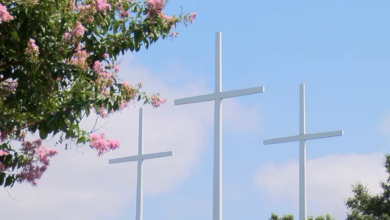Another mosque-temple controversy reaches Indian courts amid tensions

New Delhi, May 17 (EFE).- The dispute over whether a mosque in the northern Indian city of Varanasi, considered one of the holiest sites of Hinduism, has been erected on the ruins of an ancient Hindu temple has resurfaced in the country’s courts, amid growing religious tensions.
The controversy over Varanasi’s Gyanvapi mosque came into the spotlight on Monday, when a supposed “lingam” of the Hindu god Shiva – a revered figure representing the deity’s genitals – was found during a court-ordered investigation.
Although the Muslims party to the dispute have claimed that the figure is a simple fountain, the supposed discovery led to the firing of the lawyer responsible for filming the investigative video inside the mosque, Ajay Kumar Mishra, and an intervention by the Supreme Court.
Nityanand Rai, one of the lawyers arguing for the mosque’s backers at the Varanasi court, alleged that Mishra had leaked information to the media despite the court prohibiting it.
The court gave the Hindu petitioners – five women who claim there are idols inside the mosque and have sought permission to pray there – two days to submit a report about the supposed lingam, assistant judicial commissioner Ajay Pratap Singh told reporters.
The Supreme Court of India had intervened on the petition of the Muslim party and ordered authorities to protect the area where the Hindu deity is supposed to have been found, while ensuring that the mosque remained opened to those who wanted to offer Islamic prayers.
Gynavapi, built in the 17th century on the orders of Mughal emperor Aurangzeb, is situated next to the iconic Kashi Vishwanath temple, which recently underwent a multimillion dollar makeover along with the nearby riverbanks that lead to the holy river Ganges.
The current structure of the temple dates back to the 18th century, after Aurangzeb allegedly ordered the earlier building to be destroyed.
Similar controversies have also engulfed other iconic structures built by Muslim rulers, such as the Taj Mahal, with Hindu right wing leaders, including a lawmaker from Prime Minister Narendra Modi’s Bharatiya Janata Party, filing a petition to launch a probe over whether there was a Shiva Temple under the mausoleum.
However, the High Court of the state of Uttar Pradesh – where both Varanasi and Taj Mahal are situated – quashed the petition last week.
Another petition has been filed in the city of Mathura over a mosque built over land that is claimed to have been the birthplace of another Hindu god, Lord Krishna, by his devotees.
Controversies over places of worship have been a key part of the Hindu extremist politics headed by the BJP, which puts Hindus at the center of the idea of India, while relegating minorities to secondary citizens.
The head of the Muslim-backed party All India Majlis-e-Ittehad-ul Muslimeen (AIMIM), Asadduin Owaisi, compared the Varanasi controversy to the case of the 16th century Babari mosque, said to have been built by the first Mughal emperor Babar in Uttar Pradesh’s Ayodhya.
The mosque was destroyed in 1992 by violent Hindu mobs in a movement which triggered violent clashes that killed around 2,000 people. The Hindu side to the controversy had claimed that the mosque was built on the birthplace of god Ram.
The Supreme Court had in 2019 granted Hindus the disputed sacred ground for the construction of a temple in the honor of Ram.
Owaisi said in a press conference that the court verdict on Babri had opened the doors for similar petitions, even though a law brought in 1991 had ordered maintaining a status-quo on all places of worship as per their situation in 1947, except the disputed mosque in Ayodhya.
Religious tensions have been rising steadily in India, with several episodes of violence between Hindus and Muslims taking place in recent months, in the backdrop of developments such as Hindu processions to celebrate the birth of Lord Ram, the banning of the Islamic veil in the southern state of Karnataka and a controversial anti-conversion law.
Human rights groups such as Amnesty International and Human Rights Watch have flagged growing discrimination against Indian Muslims and blamed it on the BJP’s political project. EFE
daa/ia





